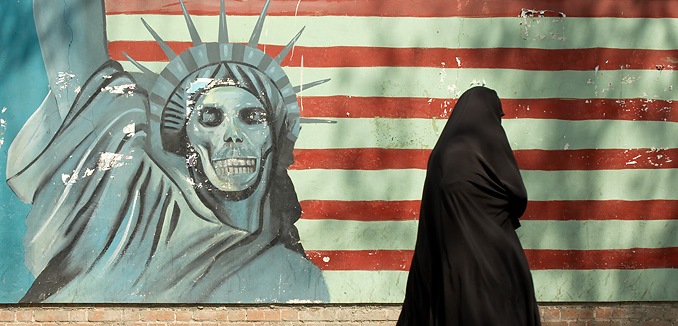Iranian civil life has been marked by an increase in executions, a “widening crackdown” on freedoms, the disqualification of thousands of candidates for public office, and ongoing discrimination against minorities and women, the UN’s investigator into the human rights situation in Iran reported Thursday.
UN rapporteur Ahmed Shaheed’s report (.pdf) covered executions, freedom of expression, free and fair elections, women’s rights, and minority rights.
Executions
There were at least 966 executions in Iran last year, the highest total in ten years. Over the past decade, the number of executions in Iran has climbed, and has reached record yearly highs in each of the three years of President Hassan Rouhani’s tenure. Last year, Shaheed called the execution rate during Rouhani’s term in office “an unprecedented assault on the right to life.” Rouhani’s appointed Justice Minister, Mostafa Pour-Mohammadi, earned the nickname “minister of murder” for having overseen the summary executions of tens of thousands of dissidents in the late 1980’s.
Freedom of Expression
While Shaheed welcomed the release of Washington Post reporter Jason Rezaian earlier this year, he also noted that “as of January 2016 at least 47 journalists and Internet users were reportedly imprisoned” by Iran. This has resulted in a dismal rating of 173 out of 180 according to the World Press Freedom Index. Shaheed also expressed regret over “a widening crackdown on freedom of expression and opinion during the reporting period, punctuated by a series of arrests carried out by the intelligence unit of the Revolutionary Guards and harsh sentences against journalists, cyberactivists and artists.” This has been abetted by increased monitoring of internet cafes. Last month, an app designed to help Tehran residents avoid Iran’s morality police was blocked by the government less than a day after it was launched.
Free and Fair Elections
According to Shaheed’s report, a record 61% of candidates for parliament were disqualified from running. That pattern was even harsher for those identified as “reformists”—only one percent (30 out of approximately 3,000 candidates) were approved. Furthermore, 80 percent of the 801 candidates for Iran’s Assembly of Experts, which selects the next Supreme Leader, were disqualified. All six women who applied were nixed, and no woman has ever been allowed to run.
Women’s Rights
Women continued to face sever discrimination. Shaheed noted that in Iran, a husband has the right to prevent his wife from travelling abroad. This happened to Iranian soccer player Niloufar Ardalan, whose husband prevented her from competing in the Asia Cup tournament by confiscating her passport. A law passed last year dictates that priority in hiring should be given to married men with children, then to married men without children, and after that to women with children. That same law prohibits all educational institutions from hiring single people for faculty positions unless no qualified married individuals can be found, and directs that “establishing peace between couples would take precedence over divorce,” giving financial incentives to judges who get an estranged couple to reconcile. Shaheed also cited an announcement by the chief of Tehran’s traffic police that his department had recorded more than 40,000 “cases of bad hijab” from March to December of last year. Punishments for women who failed to cover their hair properly included impounding of the woman’s car, fines, and possible referral to the judiciary.
Minority Rights
Shaheed documented a number of abuses suffered by the Baha’i community, nothing that such bigotry “is legally sanctioned by a lack of constitutional recognition of the faith and the absence of legal protections for its adherents.” He noted that he has received reports that “Iranian authorities continue to pursue activities that economically deprive Baha’i’s of their right to work.” This includes pressuring business owners to fire their Baha’i employees, shutting down Baha’i-owned business, and sometimes seizing these businesses and their assets. Shaheed observed that a government action in last November to shut down 23 Baha’i businesses across the country occurred the day after a Baha’i holiday. A 2013 Reuters investigation showed that one of the ways Iranian Supreme Leader Ayatollah Ali Khamenei built his business empire was by confiscating property and businesses of persecuted minorities.
Shaheed also took note of charges that Iranian Christians who had converted from Islam “continue to face arbitrary arrest, harassment and detention.” The reported also noted that in-house churches are forbidden; the government responded that such churches don’t have the necessary permits, and that such churches are unnecessary because Iran has around 20 churches operating and has not received request for new churches. The government also gave a similar answer as to why it prevents the building of Sunni mosques in Shi’ite neighborhoods, claiming that “there is no need to build prayer halls for Sunnis in Tehran.” The government also expressed fear that allowing more Sunni institutions could “sow the seeds of discord among Muslims.” According to Shaheed, a number of Sunni activists are facing execution for what the government claims are acts of terrorism.
Despite writing, rather hopefully, in his conclusion that he “believes that the human rights situation in Iran merits a measure of confidence,” the cumulative effect of what Shaheed reported suggests the opposite.
In Should the U.S. Take Iran’s Human Rights Problem More Seriously?, which was published in the April 2015 issue of The Tower Magazine, senior editor Ben Cohen highlighted Shaheed’s efforts to document Iran’s human rights situation, which has worsened since the election of Hassan Rouhani as president in 2013.
[Photo: Kamyar Adl / Flickr ]




